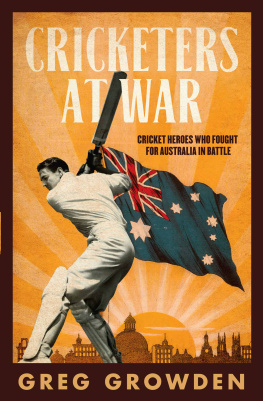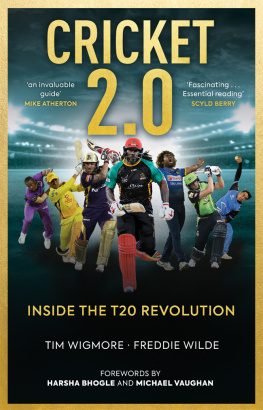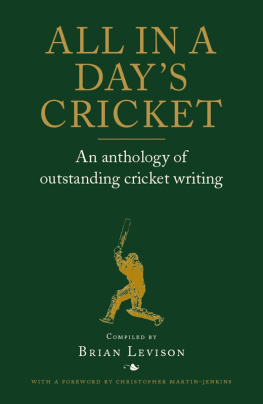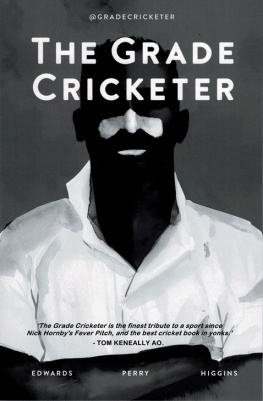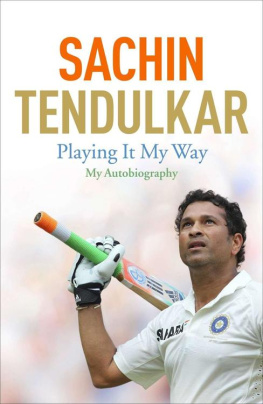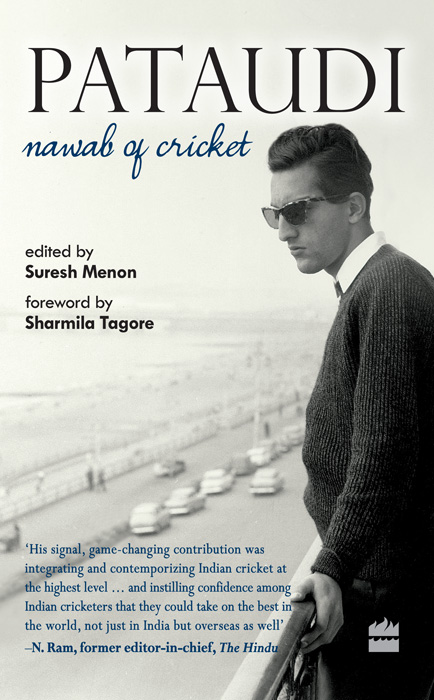

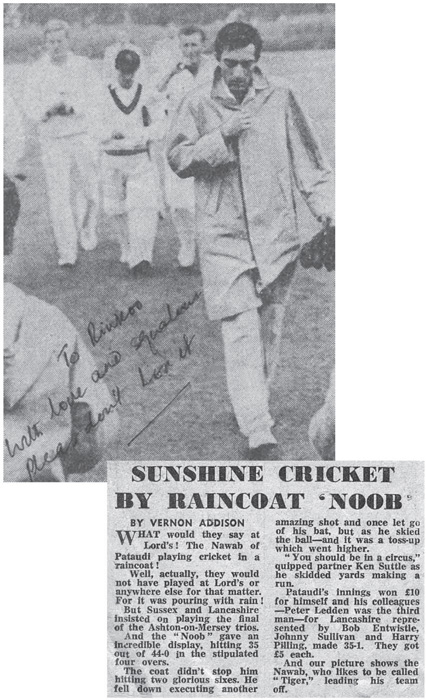
PATAUDI
N a w a b o f C r i c k e t
Edited by
Suresh Menon
Foreword by
Sharmila Tagore

An imprint of HarperCollins Publishers
CONTENTS
Tiger Pataudi taught me to keep my eye on the ball. I must have been nine or ten, and it was at a match in Bangalores Central College ground. I was there more than an hour before the start, and there wasnt much of a crowd as the players came out to warm up. As Tiger walked past, I tentatively opened my autograph book, and to my surprise he signed in it. Surprise because an earlier attempt to get a players signature had failed.
Then he asked a couple of us boys to come to the field to take some catches. Thanking all the gods whose names I could remember and in particular an uncle who had provided the pass close to the dressing room, I ran out. We stood a few metres away as Tiger threw the ball to us in turn. We held the gentle catches. And then he looked up as if making to throw the ball in the air. So did I. But it was a trick; Tiger threw the ball at the same, low, gentle trajectory, and by following his head rather than the ball, I dropped the catch.
Watch the ball, watch the ball. He smiled. Everything else that happened that day and the next several days were wiped out from my mind. Already a cricket fan, I was now cricket obsessive. If you paid a psychoanalyst enough, he might even say that that was the moment when my future career as a cricket writer was decided. Perhaps.
Everybody, even those who didnt know him (perhaps especially those who didnt know him), has a favourite Tiger Pataudi story. Many are in this anthology whose driving force has been his wife Sharmila Tagore.
It came together during a lunch in Bangalores Koshys restaurant, with V.K. Karthika, Chief Editor and Publisher of HarperCollins India. A list of writers was drawn up, deadlines were worked out, and before dessert arrived we knew exactly what we wanted. Karthikas has been the guiding hand. My thanks to her.
Her colleague Shantanu Ray Chaudhuri has been a virtual co-editor of this book, and responsible for flattening out the bumps between conception and execution. My thanks to him and to the design team at HarperCollins, including Shuka Jain and Arijit Ganguly, for a wonderful cover and a gorgeous photo insert.
Thanks to those who responded spontaneously and shared their thoughts on Tiger to make this volume both a personal journey and a historical document. I am happy we were able to include essays by the late Ray Robinson and the late Vijay Merchant. The latters thanking the chairman of selectors for retaining Pataudi as captain (by using his casting vote ahead of the series against Bobby Simpsons Australians in 1964-65) is particularly significant. For it was Merchant whose casting vote ended Tigers first spell as captain and brought in Ajit Wadekar.
My thanks go to Abbas Ali Baig, M.J. Akbar, Bishan Bedi, Mike Brearley, Ian Chappell, Mike Coward, Ted Dexter, Rahul Dravid, Farokh Engineer, Sunil Gavaskar, Tony Lewis, Robin Marlar, Naseeruddin Shah, Mudar Patherya, N. Ram, Saba Ali Khan, Rajdeep Sardesai, Soha Ali Khan, John Woodcock, and David Woolley, QC.
I cannot thank enough Sharmila Tagore for her energy, her clear-headedness, her help in gathering the forces as it were, for her encouragement through what has been a fascinating journey into the life and times of a fascinating man, and above all for the moving Foreword.
Finally, as always, my thanks to my wife Dimpy and son Tushar who have heard from me many of the Tiger Pataudi stories before, and will be glad to know that I didnt make them all up!
SURESH MENON
Bangalore, December 2012

I had loved Tiger for forty-seven years, was married to him for almost forty-three. We didnt make it to fifty. But it was a memorable partnership; certainly, an enriching one for me

27th December 2011 would have been our forty-third wedding anniversary. But we didnt make it. We ran out of time on 22nd September. On that day I stepped into a strange new world. Everything was familiar and yet everything was different. After forty-seven magical years of being together, Tiger left. I deeply mourned his absence but I could also feel his lasting presence.
Tiger has not gone away; he continues to fill my life. He is around for me in many ways I did not expect. He may not be with me when I sit down for a meal or next to me when I put my feet up for a movie, nor do I see him when I wake up in the morning. Yet he is here. Much as I feel deprived, I do not feel alone.
In that matter-of-fact way of his, he has given a stability, a sense of rectitude and a lot of cheer to our home and life. And in our life it will stay. I feel sure of it somehow. I think of this as an enduring blessing, a priceless gift and not just as a temporary consolation. That is why putting together this book is not only cathartic, but a welcome idea. It gives me another opportunity to relive all those moments we spent together often exciting, fulfilling, troubling and triumphant and once in a while even blissfully sublime.
I first met him a few weeks before my twenty-first birthday. He was three years and eleven months older. What instantly attracted me to him was his sense of humour and his innate gentleness. I felt that I could trust him implicitly. He was, even at that young age, the same person he was till the end of his life mature, calm, responsible, with the strongest sense of self. I, on the other hand, was impulsive and quite unschooled in the ways of the world. I guess we complemented each other.
When I think back on some of Tigers attitudes, actions and reactions that were so uniquely his own, I realize how he was an excellent mix of multiple cultural influences. He had an orthodox upbringing at home, where he learnt Urdu and Arabic and imbibed the ways of the manor to which he was born. His father, who played the sitar beautifully, introduced him to the richness and beauty of Indian classical music. At his behest, Tiger learnt to play the flute, the harmonium, and the tabla, which was felt to be the essence of all musicality.
While he inherited his fathers zest for life, he was also an intensely private person like his mother. His fathers unexpected death resulted in his being sent away to prep school in England at the age of eleven. His cricketing skills had already created an interest at the Roshanara Club of Delhi, where he was allowed to play with the adults under his fathers benevolent gaze. This talent blossomed at Lockers Park and over the next ten years he made his mark at Winchester and Oxford where he went on to break several records.
Girish Karnad recalls his Oxford days with Tiger, not so much his cricket but his love of music. It was great fun for us, travelling with one or the other of his musical instruments, listening, playing and humming along. There was always laughter and joy at 1 Dupleix Road, his home in Delhi. Whenever the family got together, Tiger regaled us with his hiran dance, which could compete with any of the present-day item numbers, and his hilarious
Next page


